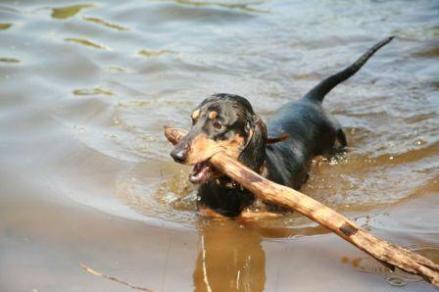
Not human bean, more than a human been!
 Training
Training
Dachshund have an independent mind of their own and must be taught at an early age that they are not the rulers of the world. The toughness that makes them suited to killing vermin can frustrate you when you try to teach them anything. They can be manipulative, and some are willful and obstinate. You must show them, through absolute consistency, that you mean what you say.
The Dachshund requires firm and consistent training, but once trained,
they are a great companion dog and extremely loyal. From an early age,
they must understand that you are the "alpha dog", as they can be quite
stubborn and resist training.
Although they are friendly, devoted, and lovable, Dachshunds can be rather hard headed at times, especially when it comes to training. These dogs do best in obedience school, and require proper obedience training and socialization in order to develop as a credit to their breed.
Training a Dachshund does not have to be all-serious it can be fun and rewarding as well. Dachshunds are very smart and willing and able to learn quickly.
Never hold a grudge against your Dachshund. After a few seconds, your dog will have no idea what you’re angry about. Dogs live in the present, and they only know that you’re angry. If you decide to punish your pup for chewing your shoe by keeping her locked up for two hours or by ignoring her all day, your punishment will be ineffective and even destructive, because your Dachshund will learn to fear you or avoid you rather than listen to you.
 Dogs are man's best friend
Dogs are man's best friend

As soon as you bring home your puppy this training starts. You will want to decide what method you want to use newspaper or puppy pads. Paper training is very useful if you are not going to use crate training.
When training your dog prior to, and after obedience class, be persistent with your commands. Remember, your Dachshund may try to ignore you. Don’t let him get away with this behavior. Your goal is to make him respond and listen to you.
When teaching your Dachshund a command, don’t use too many words. One word commands work best with dogs. If you are teaching your dog how to respond to the “Come” command, for example, don’t say “Come Here”; simply say “Come” followed by your dog’s name in a firm tone. The fewer the syllables, the faster your dog will associate the word with the command.
Basic Dachshund training is teaching them obedience. This is essential to your dog. A disobeying dog can be very hard to live with, let alone enjoy and have fun with. You will want to make sure they have the basics down like sit, stay, down, and come. These four commands will do a lot for your dog. It can keep your Dachshund safe when there is harm around or just plain out of trouble. Start this training early on. The Dachshund is a very independent dog so you will need patience with them.
Keep home training sessions to a maximum of 10 minutes. You also shouldn’t have more than 3 training session a day. After each training session reward your dog with a good playtime or a special treat such as a car ride, or a nice walk
Don’t change your method of teaching. Dachshund training needs consistency in order to work. Although he is an intelligent breed, a Dachshund has a limited attention span.
Rewarding your dog is a combination of two things: The first is your praise, the second is a treat. You don’t need to give your dog a treat every time he does a command, but it is essential that you praise and pat him each time. The more your Dachshund understands that his behavior is pleasing you, the happier he will be, and the more eager he will be oblige.
How do you talk Dachshund? First, you have to see the world from your Dachshund’s point of view. Imagine that you’re a Dachshund, scampering around about 8 inches off the ground. You’ve suddenly been uprooted from the home you knew, and here you are in a strange place with a strange creature who towers above you and keeps uttering strange, undecipherable sounds. The creature seems very nice, offering food and petting you. The voice sounds well-intentioned, and sometimes you get treats.
But sometimes the voice gets mad, irritated, and scary. Sometimes the creature appears dangerous, waving his or her arms wildly and yelling. Sometimes the yelling seems to be at you, but you can’t imagine why. You want to do whatever will make the creature talk nicely, and you sure want some more of those treats. If only
To get through to this uneducated and independent-minded little
Dachshund, you have to be very specific in your rewards. The moment she
does something good, praise her, pet her, even give her the occasional
treat. When she’s naughty, redirect her to the right activity (hand her
a chew toy, move her to her outdoor bathroom, and so on) without making
any fuss. Ignore her until she
does the right thing again and then heap on the praise. Now she’ll get
the message.
Don’t just praise your dog when she does something you ask her to. Also
praise her when she does something well or right when you didn’t ask.
Constant positive reinforcement of good behavior is integral to
developing a good relationship with your Dachshund. If you spend the
whole day yelling “No!” and “Bad dog!” but never rewarding your
Dachshund for the things she does right, she won’t learn the
self-confidence that’s so important to a well-trained and happy pet. And
she certainly won’t learn what you want her to.
If you’re always (or at least usually) calm, positive, upbeat, and happy when teaching your Dachshund the rules, as well as the fun things you and she can do together, she’ll get your meaning much more quickly. Dachshunds are all about reward. What can they do to get one, and what can they do to get another one? It’s that simple. Yelling isn’t a reward. A slap on the rump isn’t a reward. Rubbing her nose in an accident is most certainly not a reward. But a treat? A pat? A walk? An enthusiastic “What a good, sweet, darling little puppy dog you are!”? Now those are rewards that allow you to relate to a Dachshund.
In some cases, training problems or certain unusual behaviors may indicate a health problem in your Dachsie. Apart from individual differences your dog shows, be on the lookout for any of the following behaviors and alert your veterinarian. Better to catch a health problem in the early stages than to ignore it until it becomes life-threatening.
 Bad habits
Bad habits
Does your Dachshund jump up on people, dig, bark a lot, or run through doors as soon as they open? You will want to work on breaking these habits in order to keep your Dachshund safe.
